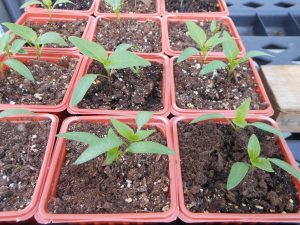What are Heirloom Plants
Heirloom plants are varieties that have been grown for at least 50 years. According to Burpee, “the term is usually applied to fruit, flower or vegetables varieties that were being grown before World War II”. These plants have had generations to develop the characteristics that give their fruit flavor, the plants natural growth habits.
Heirloom varieties are open-pollinated meaning that mother-nature does most of the work, each growing season Mother Nature brings a bit of genetic diversity to the plants. Plant a grouping of seeds of an heirloom pepper or tomato and you will collect seeds that will produce plants with most of the characteristics of the parent plants. Considerations should be made for bees coming to your garden after having visited your neighbors’ gardens adding a bit of variance – but that may be good. Heirloom vegetables  may produce a “mixed bag” harvest. The harvest may come in less predictably, and fruit size can vary greatly even on the same plant.
may produce a “mixed bag” harvest. The harvest may come in less predictably, and fruit size can vary greatly even on the same plant.
Some popular heirloom vegetables include:
- Cherokee Purple Tomatoes – This variety of tomato is believed to have originated with the Cherokee people of the southern United States. It has a deep, rich flavor and a striking purple color.
- Scarlet Runner Beans – These beans are an heirloom variety that has been grown for over 300 years. They are prized for their bright red flowers, which attract pollinators, and their edible beans, which are similar to lima beans.
- Brandywine Tomatoes – Brandywine tomatoes are a classic heirloom variety that has been grown for over 100 years. They are known for their large size, meaty texture, and rich flavor.
- Lemon Cucumbers – This heirloom cucumber variety is believed to have originated in the late 1800s. It has a round shape and a bright yellow color, with a mild, sweet flavor.
- Costata Romanesco Squash – This Italian heirloom squash has a ribbed, cylindrical shape and a nutty, sweet flavor. It is often used in Italian dishes such as pasta and risotto.
One of the main reasons I like to garden with heirlooms is you are growing a plant that is an extension of nature. Heirloom seeds are generations in the making. Nature has established the characteristics not a scientist. When growing with heirloom seeds, harvest some seeds to use next year and for sharing with family and friends to add diversity of choice for everyone’s garden and bring diversity in the natural gene pool.
Most heirlooms are not archaic plants that some adventurer discovered after fighting off hungry cannibals, as Burpee describes it: “Many heirlooms are commercially-bred varieties from the seed catalogs of the 19th and early 20th Centuries.” If you have never attempted to grow heirloom plants, give it a try, you may find flavors and plants you like.
Citations:
- “Heirloom Vegetables.” University of Illinois Extension, https://extension.illinois.edu/veggies/heirloom-vegetables.
- “Why Heirloom Vegetables Matter.” The Spruce, https://www.thespruce.com/why-heirloom-vegetables-matter-2539764.
- “What Are Heirloom Vegetables?” The Old Farmer’s Almanac, https://www.almanac.com/content/heirloom-vegetables.
- “10 Heirloom Vegetables to Plant in Your Garden.” Better Homes & Gardens, https://www.bhg.com/gardening/vegetable/vegetables/heirloom-vegetables-to-plant-in-your-garden/.